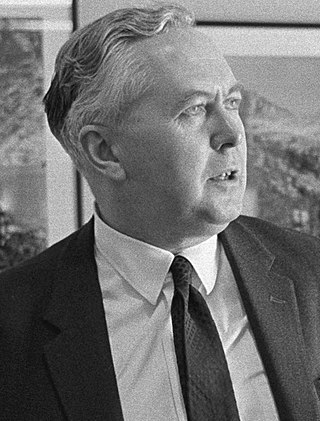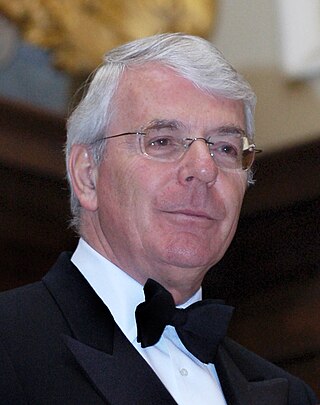
Duncan Edwin Duncan-Sandys, Baron Duncan-Sandys, was a British politician and minister in successive Conservative governments in the 1950s and 1960s. He was a son-in-law of Winston Churchill and played a key role in promoting European unity after World War II.

The Welsh Office was a department in the Government of the United Kingdom with responsibilities for Wales. It was established in April 1965 to execute government policy in Wales, and was headed by the Secretary of State for Wales, a post which had been created in October 1964. It was disbanded on 1 July 1999 when most of its powers were transferred to the National Assembly for Wales, with some powers transferred to the Office of the Secretary of State for Wales, a department popularly known as the Wales Office.
The secretary of state for the environment was a UK cabinet position, responsible for the Department of the Environment (DoE). Today, its responsibilities are carried out by the Secretary of State for Environment, Food and Rural Affairs and the Secretary of State for Levelling Up, Housing and Communities. The post was created by Edward Heath as a combination of the Ministry of Housing and Local Government, the Ministry of Transport and the Ministry of Public Building and Works on 15 October 1970. Thus it managed a mixed portfolio of issues: housing and planning, local government, public buildings, environmental protection and, initially, transport – James Callaghan gave transport its own department again in 1976. It has been asserted that during the Thatcher government the DoE led the drive towards centralism, and the undermining of local government. Particularly, the concept of 'inner cities policy', often involving centrally negotiated public-private partnerships and centrally appointed development corporations, which moved control of many urban areas to the centre, and away from their, often left-wing, local authorities. The department was based in Marsham Towers, three separate tower blocks built for the separate pre-merger ministries, in Westminster.

The Scottish Office was a department of the Government of the United Kingdom from 1885 until 1999, exercising a wide range of government functions in relation to Scotland under the control of the Secretary of State for Scotland. Following the establishment of the Scottish Parliament in 1999, most of its work was transferred to the newly established Scottish Executive, with a small residue of functions retained by the Scotland Office.

Robert Michael Maitland Stewart, Baron Stewart of Fulham, was a British Labour Party politician, life peer and Fabian Socialist who was a Member of Parliament for 34 years, and served twice as Foreign Secretary in the first cabinet of Harold Wilson.

Henry Brooke, Baron Brooke of Cumnor, was a British Conservative Party politician who served as Chief Secretary to the Treasury and Paymaster General from 1961 to 1962 and — following the "Night of the Long Knives" — as Home Secretary from 1962 to 1964.

The Conservative government of the United Kingdom that began in 1957 and ended in 1964 consisted of three ministries: the first Macmillan ministry, second Macmillan ministry, and then the Douglas-Home ministry. They were respectively led by Harold Macmillan and Sir Alec Douglas-Home, who were appointed by Queen Elizabeth II.

Kotha Raghuramaiah (1912–1979) was a veteran Indian politician and barrister who served as the Union Cabinet minister of Defence, Civil Aviation, Petroleum & Chemicals, Tourism and Parliamentary Affairs. He is one of the longest-serving cabinet minister in the History of India. The Members of Parliament from the Lok sabha and Rajya Sabha participate in a friendly Cricket competition annually for the honor of lifting the Raghuramaiah Trophy named after him.
The Royal Norwegian Ministry of Local Government and Regional Development is a Norwegian ministry established in 1948. It is responsible for the housing and building, regional and rural policy, municipal and county administration and finances, and the conduct of elections. It is headed by the Minister of Local Government and Regional Development.

The 1970 Prime Minister's Resignation Honours were officially announced in the London Gazette of 7 August 1970 and marked the June 1970 electoral defeat of the Prime Minister, Harold Wilson.

The Ministry of Economy and Finance accounts for the administration of financial and economic policy and affair in the Kingdom of Cambodia. In accordance to the official website, the ministry was commissioned by the Royal Government of Cambodia to perform missions of guidances and administrations in economic and financial affairs. The current Minister responsible for the Ministry of Economic and Finance is Aun Porn Moniroth, as of 2013. The main ministerial office is located in Phnom Penh, while the provincial branches are located across the main capitals of each province.
The 1966 Dissolution Honours List was issued on 19 May 1966 following the dissolution of the United Kingdom parliament in preparation for a general election.
Evelyn Adelaide Sharp, Baroness Sharp, GBE was a British civil servant. She was the first woman to hold the position of Permanent Secretary, the most senior civil servant in a Ministry, at the Ministry of Housing and Local Government from 1955 to her retirement in 1966.
The National Liberal Party, known until 1948 as the Liberal National Party, was a liberal political party in the United Kingdom from 1931 to 1968. It broke away from the Liberal Party on the issue of abandoning Free trade and supporting protectionism, and later co-operated and merged with the Conservative Party.

The 1992 Dissolution Honours List was gazetted on 5 June 1992 following the advice of the Prime Minister, John Major.

The 1983 Dissolution Honours List was gazetted on 21 July 1983 following the advice of the Prime Minister, Margaret Thatcher.
The February 1974 Dissolution Honours List was issued on 2 April 1974 following the dissolution of the United Kingdom parliament in preparation for a general election.
The 1970 Dissolution Honours List was issued on 2 June 1970 to mark the dissolution of the United Kingdom parliament prior to the 1970 general election.
The 1964 Dissolution Honours were officially announced on 27 November 1964 and marked the dissolution of parliament following the 1964 General Election.
The Ministry of Justice & Attorney General's Office of Ghana oversees legal matters that pertain to the State's executive power and drafts any legislation accordingly. The Attorney General is responsible for any civil cases and acts as the defendant on behalf of Ghana. The Ministry of Justice was founded in 1951 as a result of the recommendations made by the Lidbury Commission whereas the position of Attorney General originated in 1877.










